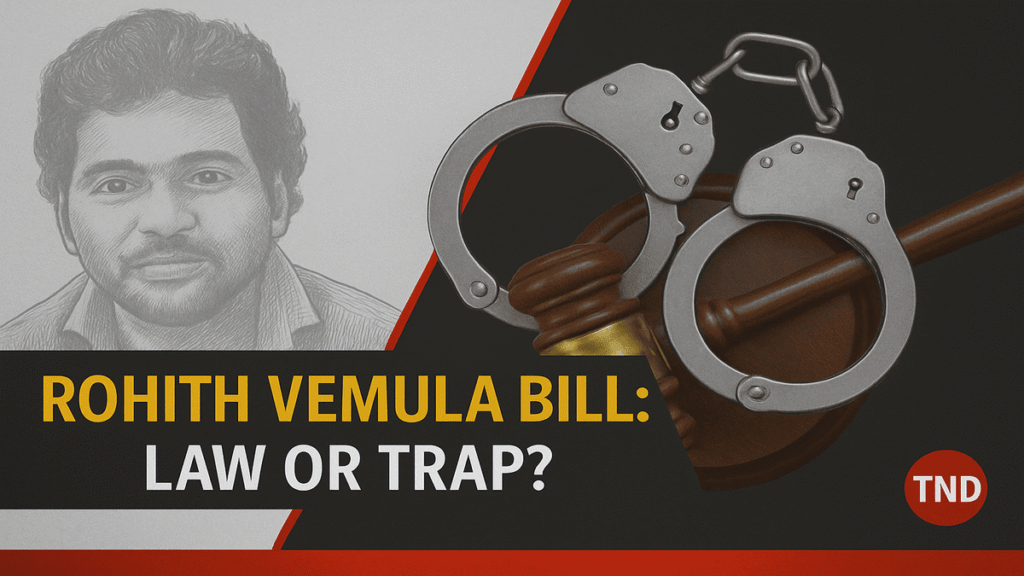
Introduction: What is the Rohith Vemula Bill?
The Rohith Vemula Bill, officially known as the Rohith Vemula Anti Discrimination Law, is a proposed piece of legislation recently tabled in the Karnataka Assembly by the Congress led government. This bill aims to criminalize caste based discrimination and harassment of Scheduled Castes (SC), Scheduled Tribes (ST), and Other Backward Class (OBC) students & Minority Students in educational institutions, both public and private.
- Introduction: What is the Rohith Vemula Bill?
- Key Provisions of the Rohith Vemula Bill
- Impact on General Category Students and Teachers
- Fake Cases: SC/ST Act as a Warning
- Political Motive: Congress’s Vote Bank Strategy
- Will It Become a Central Law?
- BJP’s Silence Raises Eyebrows
- Appeasement Politics: A Never Ending Game?
- Public Response and Legal Pushback
- Conclusion: A Law That May Hurt More Than It Heals
Named after Rohith Vemula, a PhD scholar from Hyderabad Central University who died by suicide in 2016, allegedly due to caste based discrimination, the bill is seen by many as a progressive move to protect marginalized students. However, critics argue that the Rohith Vemula Bill could become yet another tool for appeasement politics, leading to misuse similar to the SC/ST Act, and may severely impact General Category students and faculty.
Key Provisions of the Rohith Vemula Bill
The bill includes several provisions aimed at protecting students from caste based bias. Key highlights are:
- Mandatory Anti-Discrimination Officers (ADOs) in every higher education institution.
- Criminal liability for caste based discrimination, including non-verbal and subtle bias.
- Swift action and suspension of faculty or administration staff pending investigation.
- Penalties ranging from fines to imprisonment.
- Institutional audits for social justice practices.
While these steps may seem noble on paper, critics say the Rohith Vemula Bill lacks clarity on what constitutes “discrimination,” making it vulnerable to subjective interpretation and false allegations.
Impact on General Category Students and Teachers
The biggest concern about the Rohith Vemula Bill is its potential misuse. Much like the SC/ST Atrocities Act, where data and court cases have shown a rising number of false allegations, this new bill could target General Category students and teachers under vague accusations.
Presumption of Guilt
One of the most controversial aspects is the presumption of guilt. Under the bill, once a complaint is filed, the burden of proof lies on the accused to prove their innocence, creating an unjust legal imbalance.
Academic Freedom at Risk
General Category teachers may avoid controversial or challenging topics for fear of backlash or legal trouble. Student faculty relationships could become increasingly formal and strained, destroying the academic environment.
Merit and Competition Threatened
If institutional mechanisms prioritize grievance politics over academic performance, the merit based ecosystem in institutions like IITs and IIMs could collapse.
Fake Cases: SC/ST Act as a Warning
The misuse of the SC/ST (Prevention of Atrocities) Act is not a conspiracy theory it is a documented reality. Several court judgments, including a landmark 2018 Supreme Court ruling, observed rampant abuse of the Act for personal or political vendetta.
NCRB data shows a significant percentage of SC/ST Act cases either end in acquittal or are declared false during investigation.
Critics fear the Rohith Vemula Bill will follow a similar pattern, empowering fake caste discrimination allegations for political or social advantage.
Political Motive: Congress’s Vote Bank Strategy
There is growing consensus that the Rohith Vemula Bill is not about justice, but about electoral math. Karnataka, a key southern state, has a significant SC, ST, and OBC voter base. By introducing such a law, the Congress aims to consolidate this vote bank before the upcoming state and national elections.
Expansion to Other States
If successful in Karnataka, the Congress is likely to push for the bill in Jharkhand, Telangana, and Himachal Pradesh, where it holds power. Sources indicate a blueprint already exists for implementing the bill in these states.
Pressure on BJP States
Even more concerning is the political pressure it could mount on BJP led states like Uttar Pradesh, Madhya Pradesh, Rajasthan, Bihar and Gujarat. If the Congress builds enough narrative around “caste justice,” BJP may feel compelled to adopt a watered down version, just as it did with reservation policies in the past.
Will It Become a Central Law?
Should Congress return to power at the national level, the Rohith Vemula Bill could be implemented as a national legislation, affecting every college and university in India.
Given that the Congress included “social justice reforms” in its 2024 manifesto, experts believe this bill will be centralized through the UGC or Education Ministry, potentially overriding state laws and university autonomy.
BJP’s Silence Raises Eyebrows
Surprisingly, the BJP has not openly opposed the Rohith Vemula Bill. While a few MPs have voiced concerns in private, no official statement or resistance has been seen from the party either in the Karnataka Assembly or at the national level.
This silence is being interpreted as either:
- 1. Fear of political backlash from marginalized communities.
- 2. Complicity in vote bank politics, to avoid alienating SC/ST voters.
Either way, the lack of opposition from a major party like BJP raises critical questions about India’s political landscape and whether both national parties are converging on identity based appeasement.
Appeasement Politics: A Never Ending Game?
At its core, the Rohith Vemula Bill appears to be a continuation of India’s long standing caste appeasement politics. Instead of creating an inclusive and fair academic environment, the bill may:
- Divide students further on caste lines.
- Promote reverse discrimination against General Category students.
- Foster an ecosystem where victimhood is weaponized.
The move may weaken India’s education system, which already suffers from outdated curriculum and lack of global competitiveness.
Public Response and Legal Pushback
Civil society groups, student unions from General and OBC communities, and legal experts have begun mobilizing against the bill. Petitions may soon reach the Karnataka High Court and later the Supreme Court, questioning the constitutionality and due process violations inherent in the law.
Notably, human rights groups are divided while some support the bill for its intent, others criticize its overreach and bias.
Conclusion: A Law That May Hurt More Than It Heals
The Rohith Vemula Bill, while well intentioned in theory, risks becoming a dangerous tool of legal harassment, reverse discrimination, and caste polarization. If implemented without checks and balances, it will disrupt academic life, target innocent teachers and students, and shatter the dream of a merit based India.
Its expansion to other states and the possibility of it becoming a central law under Congress must be watched carefully. The silence of BJP and absence of wider political debate makes the situation even more dangerous.
India needs laws that ensure equality, not appeasement, and policies that empower without dividing.






